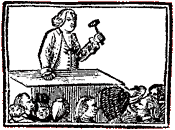The Trials of Thomas Careless
My article, titled “Thomas Careless of the Royal Navy: Tried for Murder in Newport, Court-Martialed for Tossing a Block Islander,” grew from the series of Boston 1775 postings from May 2017 about how Midshipman Thomas Careless went on trial for killing Newport man Henry Sparker. This month has brought the sestercentennial of that trial.
There are a couple of Boston connections to that Rhode Island story. First, the Boston Chronicle had the most detailed report on what led Careless to stab Sparker. Rhode Island newspapers withheld some information, ostensibly to protect the integrity of the trial but perhaps also to maintain the colony’s respectability.
Second, the Royal Navy vessel on which Careless was serving, H.M.S. Senegal, was one of the warships that brought British troops to Boston in the fall of 1768. In fact, we discovered that the best period pictures of that ship were produced by Christian Remick and Paul Revere (as shown above) while the Senegal and the rest of that fleet lay in Boston harbor.
The Small State, Big History article also contains another story about Thomas Careless that I hadn’t found when I wrote my 2017 postings. He returned to Rhode Island during the war—and got in trouble again!
In connection with this article, I’m scheduled to appear on Bruce Newbury’s “Talk of the Town” show on WADK (1540 AM) in Newport on Monday morning shortly after 10:00 A.M. to talk about Sparker, Careless, and what their fatal encounter says about the American Revolution.
Small State, Big History comes from a team led by Christian M. McBurney, author of Spies in Revolutionary Rhode Island, Kidnapping the Enemy: The Special Operations to Capture Generals Charles Lee and Richard Prescott, and The Rhode Island Campaign: The First French and American Operation of the Revolutionary War, among other history books. Its weekly articles cover the whole range of the colony and state’s history, from founding to recent politics.
[ADDENDUM: Here’s a recording of my conversation with Bruce Newbury of WADK, starting off the hour after news.]




